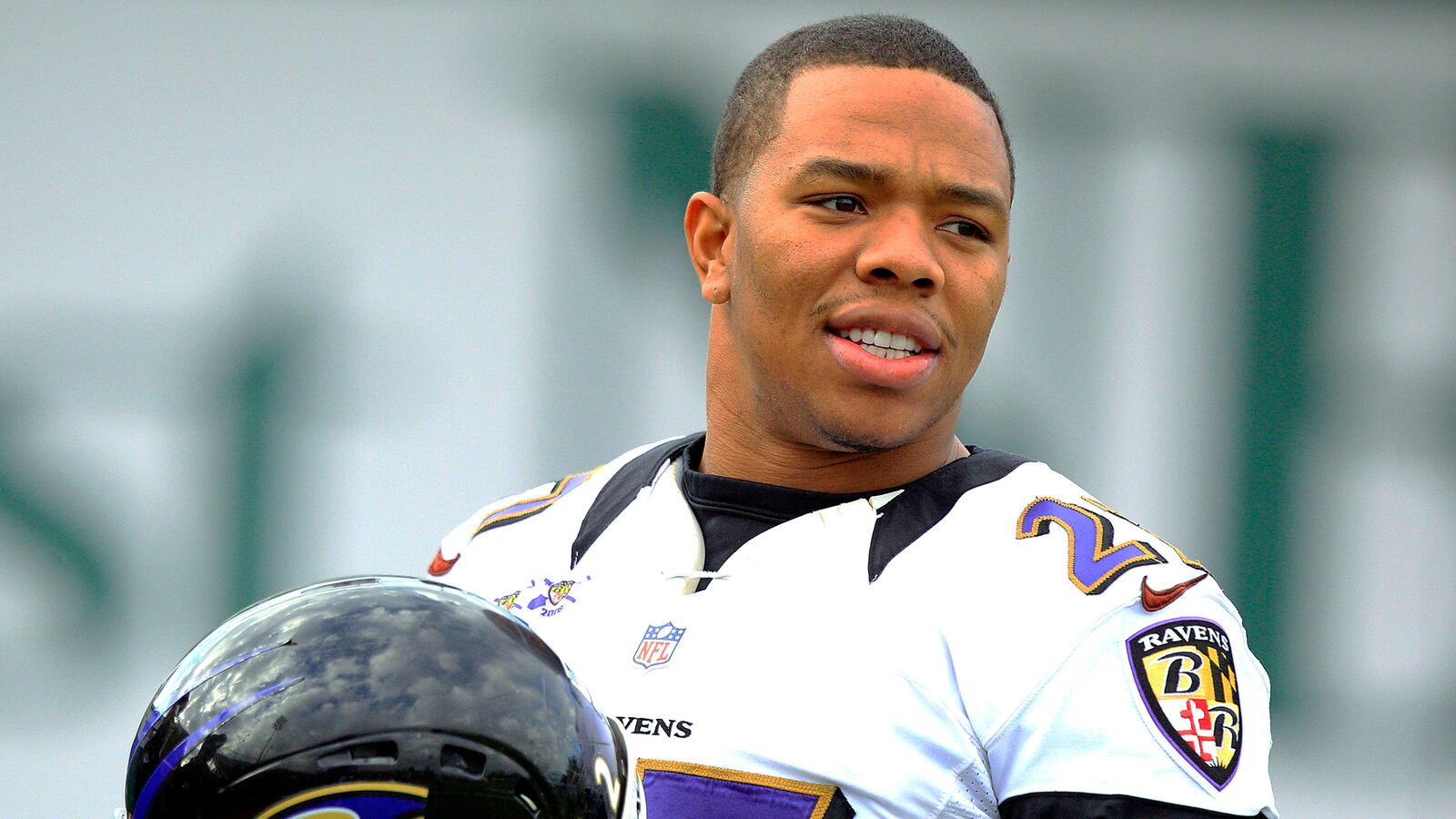Monday’s announcement that Ray Rice would be released from the Baltimore Ravens, and indefinitely suspended from the National Football League, was met with celebration. Five months after a video first surfaced of the 27-year-old running back dragging his unconscious fiancee Janay Palmer out of an elevator at an Atlantic City hotel—and in lieu of any legal consequences—the NFL had finally handed down a punishment that, somewhat, seemed to fit the crime. All it took was the release of another surveillance tape, this one explicitly showing Rice deliver the blow that left his would-be wife limp on the elevator floor.
Last week, after originally serving Rice with a measly—and widely admonished—two-game suspension, NFL commissioner Roger Goodell announced that the league would be adopting a new domestic violence policy. First-time offenders would be suspended for six games without pay. Second offenses would be punished by banishment…that could be appealed after one year. After the second video circulated Monday, Rice became the first player punished under the new policy.
Almost everyone except Janay Rice applauded the move, though questions remained as to whether, contrary to what Goodell has said, the NFL saw the second video prior to its public release. But Monday’s news, and Janay Rice’s subsequent response, raised a different set of questions for domestic violence experts that highlight just how complicated the issue of domestic violence is.
While Rice inarguably deserved to lose his job, could the NFL have done more to ensure that he gets help? By suspending him indefinitely, did the NFL do more to disassociate itself from Rice’s heinous actions than to make the player, their employee, take responsibility for them? After all, the new domestic violence policy does not require offenders to go through any kind of counseling before they can petition for reinstatement after a year. What incentive does Rice have to change his behavior?
And above all, despite her public declarations of love for her husband and requests for privacy, those who best understand the twisted, dark realities of domestic violence can’t help but wonder, what kind of danger is Janay Rice in now?
“This is possibly the most dangerous time in a relationship, when the abusive partner loses his job. Especially an NFL football player, something he’s worked for all his life,” Katie Ray-Jones, CEO of the National Domestic Violence Hotline, told The Daily Beast Tuesday. She’d just left a celebration of the 20th anniversary of the Violence Against Women Act hosted by Vice President Joe Biden in Washington. “It’s difficult for someone who has excellent coping skills to deal with, even worse for people with abusive skills. I would not be surprised if he is taking it out on her.”
What’s more, if the NFL or the Ravens have cut all ties with the Rice family, that means the Rices may have lost whatever employer benefits might cover domestic-violence counseling, Ray-Jones said.
And she’s not talking about couples counseling, or the pre-trial diversion program Rice was accepted into in lieu of prosecution, despite the fact that the program generally does not admit people charged with violent crimes.
What Ray-Jones is talking about is an abusive partner treatment or batterer intervention program. The names and and duration vary from state to state, but what is consistent is the objective: to force abusers to take responsibility for their actions, analyze the power and control dynamics that trigger violent behavior, and learn what an equality-based relationship looks like.
Jerry Zabin runs one of these programs, called Partner Abuse Intervention Services, in Evanston, Illinois and he’s careful to clarify that the service he provides is in fact “intervention,” rather than “treatment.”
“You’ll read in the paper that a woman was murdered on Thursday and on Wednesday she had filed an order of protection,” Zabin told The Daily Beast. “This is very much an intervention.”
In Illinois, such intervention programs last a minimum of 26 weeks; other states require the duration to last at least a year. Zabin facilitates men-only group sessions, focused on empathy development, and helping men to take responsibility for their actions rather than blame their victims for what they do. A big part of this, Zabin says, is teaching men to sit with uncomfortable feelings without becoming reactive. One of his mantras is, “postpone judgements.”
“Thoughts always precede actions. If he is thinking in his head, ‘I could just kill her or I could just slug her,’ he’s much more likely to progress,” Zabin said. “He has to think, ‘It’s ok. It’s not the end of the world. She’s got a right to her own opinion.’ Supplant those aggressive thoughts.”
Where abuser intervention programs differ from other types of counseling, like anger management, is the focus on violence not as a manifestation of anger but as a means of asserting power or control in a relationship.
“When a guy says to me, ‘I lost control and I hit her,’ my stock response is, ‘You didn’t lose control. You became more controlling,’” Zabin said.
Zabin has worked with more than 800 perpetrators of domestic violence over 28 years. He says the majority of his clients are court-mandated to attend his 26-week group sessions. The rest are wife- or girlfriend-mandated. He says his program is successful because he doesn’t let just anyone in. Zabin evaluates each potential participant individually to determine not only if he’s committed to changing, but whether he has the potential to murder his partner. The less hobbies, friends, or other interests an abuser has outside his wife or girlfriend, the greater the chance he will kill her.
“This isn’t about buddying or bonding with the guys,” Zabin said. “The goal is always the safety of the woman.”
It’s extremely rare that Zabin will get a call from a man who hasn’t either been kicked out of his house, threatened with divorce, or handed a court-order. Still, Zabin requires that anyone who wants to participate in his program call and schedule an initial assessment himself—and pay for it.
“A lot of times women will call and say they want to schedule an intake for their boyfriend or husband and they want to pay for it,” he said. “There has to be accountability. And he has to pay for at least some of it out of his own pocket for this to have value.”
Zabin’s program rarely receives men who’ve been required by their employers to attend, and those are usually people with safety-sensitive jobs, like police officers. He once received a referral from the Coast Guard, who insisted on paying for their member’s enrollment in the program despite Zabin’s protests. After the first session, the man started skipping sessions and Zabin called his commanding officer, urging him to require the man to pay at least $20.
“They finally agreed he should pay. He was furious, but he never missed a session again,” Zabin said.
Like Ray-Jones, Zabin noted that “either financial disaster, or the prediction or perception of financial disaster,” is usually what sets people off. But echoing the message he promotes in his group sessions, no one—not the media, or the NFL, nor Janay Rice—is responsible for Ray Rice’s newfound unemployment, or how he will choose to handle it.
“There is going to be backlash. People will say, ‘they ruined his career.’ But there is no ‘they.’ He did it. He threw away his career.” Zabin said. “Certainly it impacts both of them financially, but at the same time, he could have broken her neck. He could have killed her. And that was on film. You can only imagine how many times something like that happened behind closed doors.”






